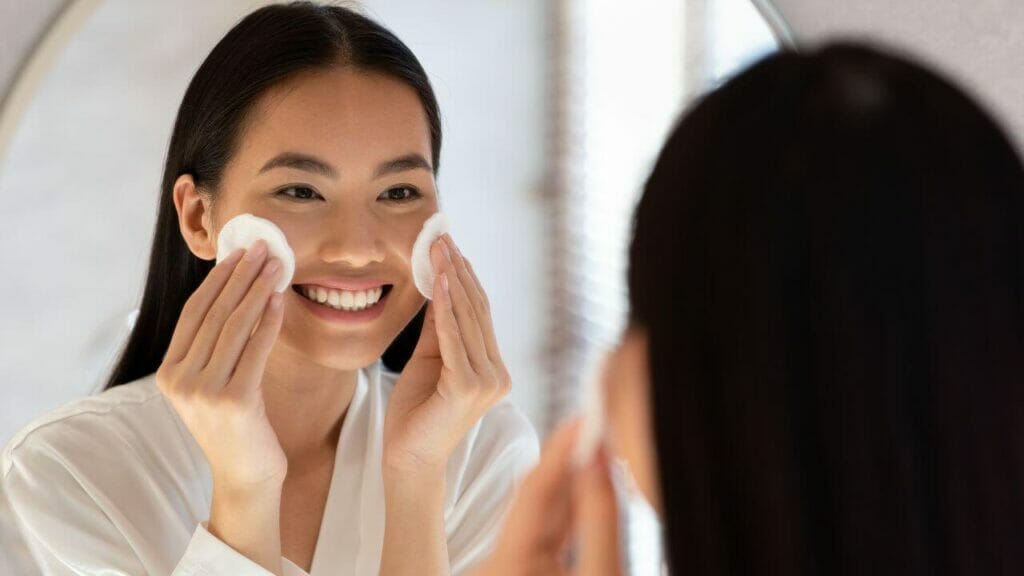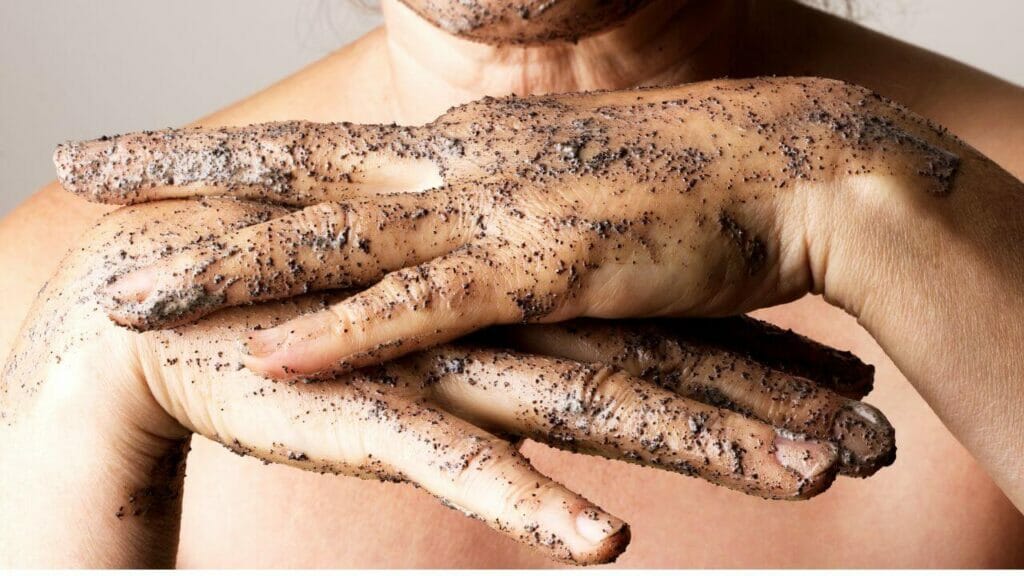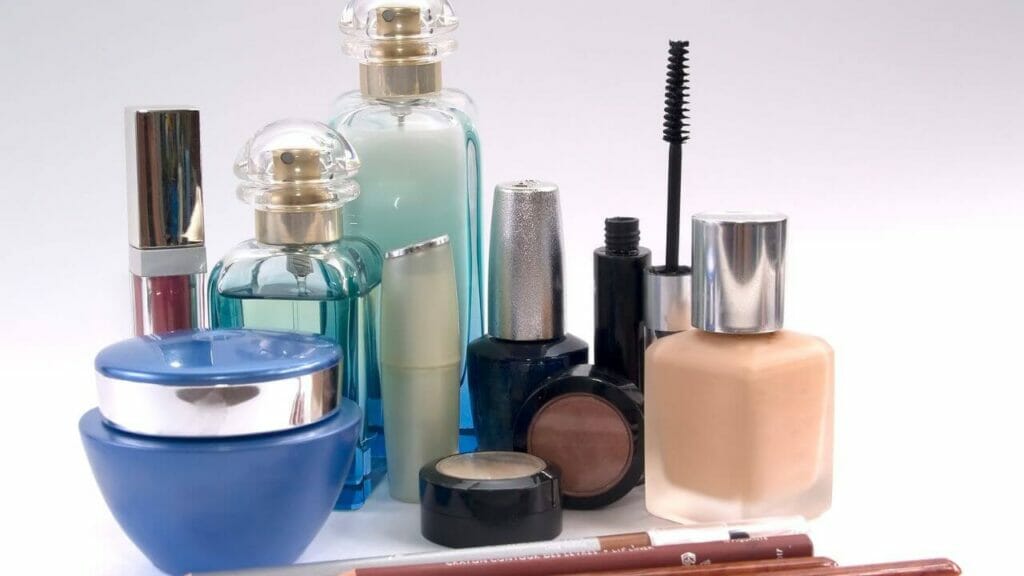To have smooth, shiny, good-looking skin is never greed. It is quite natural for anyone to have a desire for healthy skin. In fact, healthy skin means your body and mind are in great health too. And we all have quite a few skincare regimens – everyday regimens, weekend regimens, monthly regimens, etc. Despite the desire and efforts, most of us might still not be satisfied with how our skin looks or feels. Check if you are making any of the following common skincare mistakes, for these blunders might be the culprits for the flaws of your skin.
Common skincare mistakes you might do
The following are six common skincare mistakes you are unaware of harming your skin.
1. Sleeping with your makeup/not removing makeup properly
Sleeping with your makeup on or not properly removing makeup can harm your skin in several ways.
- Firstly, makeup can clog your pores, which can lead to acne and breakouts. When you sleep with makeup, it can mix with your skin’s natural oils and sweat, creating a breeding ground for bacteria to grow. This can cause irritation, inflammation, and even infections.
- Secondly, makeup can cause oxidative stress to your skin. This means that the chemicals in your makeup can react with the oxygen in your skin and produce free radicals, which can damage your skin cells, leading to premature ageing and even cancer.
- Finally, leaving makeup on your skin overnight can clog skin pores and prevent it from breathing and repairing itself. This can result in dull, tired-looking skin and may even cause fine lines and wrinkles over time.
Steps to remove makeup:
- Wash your hands before removing your makeup to avoid spreading bacteria or dirt to your face.
- Choose a gentle makeup remover that suits your skin type. Apply the product on a cotton pad or a clean cloth and gently wipe off the makeup from your face, including the eyes and lips.
- Use a gentle cleanser to remove any remaining traces of makeup and dirt from your skin. You may need to double cleanse if you have used heavy or waterproof makeup.
- Rinse your face with lukewarm water to remove the remaining product.
- After rinsing, pat your face dry with a clean towel. Do not rub your face with the towel, which can cause irritation.
- Apply a moisturiser to hydrate and nourish your skin. This will prevent it from drying out overnight and help it repair itself while you sleep.
Tip: Have one or two no-makeup days a week and let your skin breathe without any products on it.
2. Over exfoliating
Exfoliating can help remove dead skin cells that can clog pores, making the skin look dull. But doing it too often can have negative effects.
Over-exfoliating is a common skincare mistake that can damage the skin’s natural protective barrier, leading to irritation and sensitivity. The skin also loses its ability to retain moisture, making it dry and flaky.
It can also cause micro-tears on the surface of the skin, which can make it more vulnerable to environmental damage and allow bacteria to enter. This can lead to inflammation, breakouts, and even infection.
It is important to exfoliate your skin but only in moderation. Most skin types can benefit from exfoliation once or twice a week. However, you may want to exfoliate less frequently or use a gentler exfoliant if you have sensitive skin. Limiting exfoliation ensures that your skin stays healthy, smooth, and glowing without causing any damage or irritation.
- Also Read: Bring Back The Glow: Homemade Face And Body Scrubs To Exfoliate Your Skin Gently And Effectively
3. Using hot water to wash your face
Another skincare mistake you might make is while washing your face. If you live in a tropical climate, washing your skin with normal-temperature water is always good. However, this is not possible if you live in cold conditions. In such a case, use lukewarm water, but never hot water.
Because washing your skin with hot water can,
- Strip your skin of natural oils: Your skin has natural oils that are vital to keep your skin hydrated and healthy. Washing with hot water can strip your skin of oils, leaving your skin feeling dry, tight, and flaky.
- Cause inflammation: Hot water can cause inflammation in your skin, particularly if you have sensitive or acne-prone skin. This can cause redness, irritation, and even breakouts.
- Break down collagen and elastin: Hot water can break down collagen and elastin, which are two essential proteins that keep your skin firm and supple. Eventually, this can lead to wrinkles and sagging skin.
- Worsens existing skin conditions: Hot water can worsen existing skin conditions such as rosacea, eczema, and psoriasis. It can cause flare-ups and exacerbate the symptoms of these conditions.
To protect your skin, it’s best to use lukewarm water to wash your face. This will help to maintain the natural oils in your skin and prevent inflammation and other harmful effects of hot water. Additionally, avoid rubbing your face too vigorously and always pat your skin dry with a clean towel.
You May Also Like:
- Did You Know You Don’t Need Soap Or Shampoo To Clean Yourself?
- Simple DIY Turmeric Face Masks For Skin Health
4. Skipping sunscreen
There is always some confusion behind the use of sunscreen. What should be the SPF? How often to reapply? Do they cause acne? Does it suit all skin types? Do dark-skinned people need it? Do people in tropical countries need less of it? And so on.
Of course, we are not discussing that right now. Simply put, sunscreen is important for all, irrespective of your skin colour and the place you live, because exposure to the sun may cause the following.
- Sunburn: Exposure to the sun’s harmful UV rays can cause sunburn, which can be painful and lead to peeling and blistering. Repeated sunburns can increase your risk of skin cancer.
- Premature ageing: UV rays from the sun can cause premature ageing, including wrinkles, fine lines, and age spots.
- Skin cancer: Exposure to UV rays from the sun is a leading cause of skin cancer. This includes both melanoma, which is the deadliest form of skin cancer, and non-melanoma skin cancer.
- Uneven skin tone: Sun damage can cause hyperpigmentation, leading to an uneven skin tone and making your skin look dull and lacklustre.
Hence, wearing sunscreen daily, even on cloudy days, is essential to protect your skin.
5. Not changing your pillowcases
Changing your pillowcases has more reasons than aesthetics. Change them regularly, and your skin will thank you!
Reasons why changing pillowcases is good for the skin:
- Reduces bacteria: Over time, your pillowcases can accumulate bacteria from your skin, hair, and environment. By changing your pillowcases regularly, you can reduce the bacteria that come in contact with your skin, preventing breakouts and other skin issues.
- Prevents clogged pores: Dirt, oil, and bacteria can also block your pores, which can cause acne and other skin issues. By changing your pillowcases regularly, you can reduce the amount of dirt and oil that comes in contact with your skin, which can prevent clogged pores.
- Promotes healthy skin: By changing your pillowcases regularly, you can enable healthy skin by reducing the amount of dirt and bacteria that come in contact with your skin. This can help prevent breakouts and other skin issues and keep your skin healthy and radiant.
Changing your pillowcases at least once a week or more often if you have acne-prone or oily skin is recommended to maintain good skin. Additionally, a silk or satin pillowcase can help prevent friction and irritation on your skin while sleeping.
6. Use of harsh products
Last but not least, you must pay attention to your skin products. From the cleanser to makeup remover, you might be using a dozen skincare products every day. And using the wrong products is another common skincare mistake many make. Remember the following while choosing the products, as some of them might act harsh on your skin.
Signs your skincare products are hard on your skin:
- Irritation: Harsh skin products can irritate your skin, causing redness, itching, and burning. This can lead to discomfort and make your skin more sensitive over time.
- Dryness: Some ingredients can rob your skin of its natural oils, leading to dry, flaky, and rough skin. This can make your skin look dull and aged.
- Acne: They can trigger breakouts by irritating your skin and causing excess oil production. This can make acne worse and lead to more severe blemishes.
- Inflammation: They may cause inflammation in your skin, leading to more severe skin issues like rosacea and eczema. This can cause discomfort and make your skin more sensitive over time.
How to choose less harsh skin products?
- Look for natural ingredients: Choose products that contain natural ingredients, such as chamomile, aloe vera, and tea tree oil. These ingredients are gentle on the skin and can help to soothe and heal your skin.
- Avoid harsh chemicals: Avoid products that contain harsh chemicals like sulphates, parabens, and fragrances. These can irritate your skin and cause breakouts and other skin issues.
- Test the products on a small patch of skin: Before using a new product, test it on a small patch to ensure that it doesn’t cause any irritation or allergic reactions.
- Choose products based on your skin type: Choose products specifically designed for your skin type, whether dry, oily or combination. This can help prevent skin issues and keep your skin healthy and radiant.
- Read product labels: Read the labels carefully to ensure the product is suitable for your skin type and doesn’t contain harsh chemicals.
- See a dermatologist: If you have sensitive skin or are prone to skin issues, consult a dermatologist who can recommend gentle and effective products for your skin.
Look out for these common ingredients in skincare products that can be harsh on your skin:
- Sulphates: Sulphates are commonly used in skincare products as a foaming agent, but they can be harsh on the skin, stripping away natural oils and causing dryness and irritation.
- Parabens: Parabens are used in skin care products to increase their shelf life. But they can disrupt hormones and cause skin irritation and allergic reactions. They are potential carcinogens too.
- Fragrances: Fragrances are often added to skincare products to improve the scent, but they can cause skin irritation and allergic reactions, especially for those with sensitive skin.
- Alcohol: Alcohol is commonly used in skincare products as an astringent or to improve the texture of the product, but it can be drying and irritating to the skin.
- Retinoids: Retinoids are commonly used in anti-ageing products to reduce the appearance of wrinkles, but they can be harsh on the skin, causing dryness, redness, and flaking.
- Acids: Acids, such as glycolic acid, salicylic acid, and alpha-hydroxy acid, are commonly used in skincare products to exfoliate and brighten the skin, but they can be harsh on the skin, causing dryness, irritation, and redness.
It is not possible to choose all-natural products. Also, some ingredients, including natural ones, may suit one skin type and would irritate another. Choosing the right skin products itself is an exercise, and there is no easy way to do that.
Here are some tips to zero in on the right products:
- Choose products for your skin type.
- Try to go for products using natural ingredients and lesser chemicals.
- Don’t buy into the hype.
Love4wellness concludes,
End of the day, we all aim for child-like skin😀 Yes, we know that’s impossible. What we can realistically aim for is slow and graceful ageing, fewer blemishes and healthy-looking skin. But unfortunately, some common skincare mistakes may harm your skin instead of enhancing it. So, learn about them and avoid them, lest you may lose the beauty you already have!
Images: canva.com







